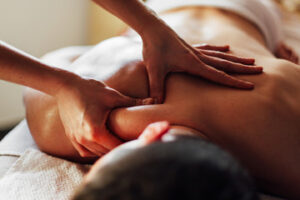Massage is a great way to relax, but it also has many health benefits. It can help decrease the stress hormone cortisol, improve circulation, increase feel-good hormones, and boost flexibility.
Regular massages are also said to promote feelings of general well-being and help patients trust their care providers. This sense of connection may also make it easier for patients to discuss complex psychological issues. Visit their Website to learn more.
Pain relief is one of the most common reasons people seek massage. Chronic muscle pain can result from a wide range of issues including overuse, poor posture, comorbid health conditions and stress. Tense muscles can create painful bundles of tissue and lead to the build up of inflammatory toxins. These toxins restrict flexibility and decrease range of motion. Massage can break this cycle by increasing relaxation and circulation which can relieve the underlying cause.
The friction between the skin and fingers during massage creates heat which encourages blood flow. This allows oxygen and nutrients to reach muscle cells. It also helps to remove waste products like carbon dioxide and lactic acid. This helps to reduce inflammation and improve muscle function and flexibility.
Research supports that a good massage can increase the levels of ‘feel-good’ hormones like serotonin and dopamine which are responsible for reducing stress, anxiety and depression. These chemicals also block pain signals sent to the brain, reducing our perception of pain and helping us feel more relaxed.
In addition, research shows that massage can help to reduce pain caused by a variety of conditions including osteoarthritis, back pain, neck pain and shoulder pain. This is due to the effects of the pain-killing hormones released during a massage.
A number of different theories about how massage relieves pain have been suggested. One theory suggests that massage may interfere with pain pathways in the nervous system by stimulating larger nerve fibres close to the skin which can interrupt or block the pain messages being sent (closing the gate). Other studies have shown that a chemical in the body called’substance P’ decreases following a massage, and this is involved in sensory and nociceptive pathway signalling.
Improves Circulation
The shallow friction (effleurage) of massage increases skin and regional warmth, which boosts blood flow to the effected tissues. This increased circulation also decreases muscle and tissue toxins and enhances the immune system, among other things.
In addition to improved blood circulation, massage improves lymphatic drainage. The manual techniques used in this type of massage, developed by Emil and Estrid Vodder, a Swedish physician duo, increase the rate at which lymph flows back toward the heart. This improvement in lymph flow helps drain excess fluids and metabolic wastes, including lactic acid, from the muscles.
Massage can also help prevent and treat pressure ulcers, which are sores that develop on areas of the body that come into contact with a surface for extended periods of time. The pressure applied by a massage therapist to the affected area during a rubdown encourages circulation, and the squeezing and pulling motions can help prevent the formation of these painful sores.
In the same way, if you are in cardiac arrest, chest compressions—passively pumping the chest to passively simulate a heartbeat—are very effective at increasing circulation and helping to revive your heartbeat. This is because, like a good massage, it increases both skin and intramuscular warmth and induces vasodilation, which opens the vessels that supply blood to the affected tissue.
But, if you are a patient receiving a medical procedure, changing position and doing gentle exercise is much better at increasing circulation than getting a massage. So, if you’re hoping that your next visit to the massage therapist will cure a pressure ulcer, just change positions and go for a walk or a workout. It’ll probably be more fun, too.
Reduces Stress
Stress is a natural part of life but too much can lead to serious health issues. Massage is a great way to relieve stress and relax the body. A recent study found that just 10 minutes of relaxation can activate the body’s system for overcoming stress, called the parasympathetic nervous system. This helps slow down the heart rate, improves circulation and reduces muscle tension.
Massage encourages the body to relax physically by increasing muscle temperature and improving the flow of blood through muscles and soft tissue. The body also releases feel good hormones that calm the peripheral nervous system, the communication relay between the brain and the extremities.
A massage can help reduce stress and anxiety in the psychological realm by decreasing the level of cortisol produced in response to a threat. It can also increase endorphins and serotonin, the body’s “feel-good” hormones that create a positive frame of mind.
Studies have found that massage reduces symptoms of stress, such as a weakened immune system and digestive problems. Chronically stressed people often have a hard time sleeping, and it’s a good idea to have regular full-body massages to help get your body into a better sleep pattern.
Massage also stimulates the lymphatic system to increase the speed of removing metabolic wastes. This is important after an injury because a buildup of metabolic wastes can cause swelling, muscle fatigue and weakness. Massage can help decrease stress and pain that can inhibit healing and lead to frustration over not being able to exercise or play sports. Massage can also help reduce the amount of muscle fatigue and weakness from injury by encouraging relaxation. The physical and psychological benefits of massage can make it an integral part of a holistic stress management program.
Increases Flexibility
Increasing flexibility through massage is important for athletes in order to maximise performance. Tight muscles restrict movement and increase the chances of injury. Massage increases flexibility by decreasing pain, loosening tight muscles and increasing the elasticity of muscles. It also stimulates the body’s natural production of endorphins which work as a natural pain killer. When a muscle is relaxed and flexible its capable of stretching to its full potential which decreases tension and maximises performance.
Tight muscles produce waste products that build up and cause muscle tightness, fatigue and pain. Massage increases the lymphatic drainage of the body which is responsible for flushing waste products out of the muscles. When the build up of waste products is removed muscle tightness and fatigue is decreased and flexibility increased.
Athletes that receive massage regularly can perform at their peak throughout the season and beyond. This is because regular massage increases muscle elasticity and helps to prevent injuries by increasing range of motion. Massage is especially helpful before a game or competition as it reduces stress and anxiety which can cause tense muscles.
Massage increases the elasticity of muscles and soft tissue and can help to relieve adhesions that are a common symptom of injuries. Adhesions are fibrous tissues that lie haphazardly across normal muscle fibres causing tightness and reduced movement. Massage can break down adhesions and realign the collagen fibres of a muscle into their normal form which increases flexibility. Massage also aids in the removal of waste products following injury that can build up and decrease flexibility. The lymphatic drainage system is stimulated by massage which helps the waste products to be drained away from the injured site.
Increases Feel-Good Hormones
Aside from its physical benefits, massage is known to have a strong effect on your mental health. This is because it helps to strengthen your mind-body connection by triggering the release of “feel good hormones” like endorphins, serotonin and oxytocin. These hormones help to numb the triggers of anxiety and depression. This is why some people find that getting a regular massage can be very helpful in combating feelings of depression and anxiety, especially when they are coupled with other self-care activities like exercise and meditation.
Studies show that massage reduces the stress hormone cortisol, which causes the body to enter into its fight or flight response. It also increases the body’s production of serotonin, another “feel good” neurotransmitter. This is one of the reasons that people feel so relaxed and mellow after a massage.
There are a few small studies that indicate that massage can cause the brain to release more of the opiate-like painkilling substance called morphine. However, this is not a common effect. Most massages are gentle enough to not trigger this reaction in the body. It is thought that the relaxing effects of massage are due to the stimulation of the parasympathetic nervous system, which slows the heart rate, lowers blood pressure and relaxes the muscles.
In addition, the calming effects of massage stimulate the release of oxytocin, which is known as the bonding hormone and the “love hormone.” Oxytocin can increase trust and improve relationships, and it is released during breastfeeding and during cuddling. It is also thought that oxytocin and other hormones released during massage promote feelings of compassion and empathy toward others. This may explain why many people report feeling euphoria and joy after a massage.
